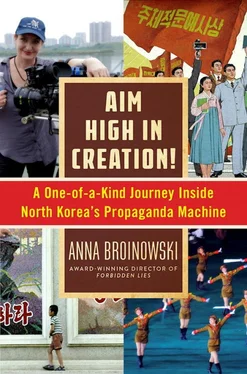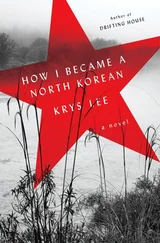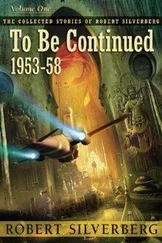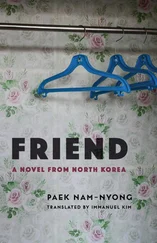One thing Mr. C does respect about Kim Jong Il is the way he deified his father on film: “When he joined the Labour Party at twenty-two, Kim Jong Il worked in the Department of Propaganda and Instigation. The first thing he did was use fact and fiction to make war movies about Kim Il Sung’s anti-Japanese fight. I liked them very much. My favourites were Order 027 and Crude Wings .” Mr. C watched these movies with the soldiers he lived with at the DMZ. He even remembers being shown an American film to study military techniques: “It was called A Guy Crossing the River . Despite the fact it was made by an enemy country, we were required to learn the action skills it contained. In my service on the border between the two Koreas, we did a lot of special action training.”
I do not know of any American movie called A Guy Crossing the River . The real title was evidently lost in translation while being smuggled through China and into the DMZ. I’m guessing the movie is probably David Lean’s World War II classic The Bridge on the River Kwai , given its anti-Japanese message and detailed scenes of guerrilla warfare. There’s something poignant about Mr. C and his mates hunched over a VHS machine in 1992, watching a movie made in 1957 to learn how to fight the Americans—especially when compared with the high-tech 3D computer games the Pentagon uses, simulating terrorist-infested Arab villages and North Korean dungeons crawling with commies, to train its soldiers in the art of modern warfare.
Mr. C has no problem with the fact that North Korean movies use their actors to sell propaganda: “It’s same in South Korea. Costumes worn by actors create a fad. South Korean clothing companies put their products in movies to generate a marketing effect. I think humans are inherently the same when it comes to material desire. South Koreans live in an open society and pursue luxurious foreign brands. North Koreans are still cut off from the outside world, with no knowledge of these products. So they crave the clothes of their actors, which are modest and tidy.”
Mr. C stops speaking and looks up. A group of black-suited men have walked into the main office. They sit on a couch and stare coldly at me and Mr. C through the window of our booth. Mr. C does not acknowledge them, but nor does he look surprised. It’s a little creepy. I decide to wrap things up and ask Mr. C to sing. He blushes: “I’m not a good singer. During my military service on the DMZ, we had to sing three times before every meal, especially military songs and songs lauding Kim Jong Il. The one I remember is from my favourite movie, Order 027: ‘Secretly crossing the front, tonight as always…’ ”
Mr. C stops and laughs. It’s true; he’s a terrible singer. I laugh too. Through the glass, the men on the couch just stare at me, their expressions unchanged.
That night, Monica takes me out to unwind in a bar so expensive there’s no menu. I nibble on a desiccated bubble that tastes of seaweed, and Monica sidles over to an androgynous boy in a caftan. He wears Tibetan beads, jeggings, and thongs. He slouches over a tablet, peering at it through his dreadlocks. Monica flutters around him, giggling. She points at me: “All the way from Australia. A documentary. On North Korea!” Dreadlocks gives me a bored once-over, slides off his stool, and wanders off, followed by a skinny girl with leather boots up to her crotch. Monica gulps her margarita, flushed with excitement. Dreadlocks is the highest paid commercials director in Seoul: one of the bright young things driving the Korean Wave—the avalanche of cutting-edge art, technology, media, and pop culture that has revolutionised Asia.
In the city’s neon-bright streets, innovation is everywhere—in the gadgets, fashion, and architecture, and on the ubiquitous HD screens. Gazing at the uber-cool, glittering crowds, I have the same feeling I had twenty years ago in Tokyo: that I’ve slid exactly five years into the future. On the circular screen of a crenulated yellow skyscraper, Japanese teenagers mob a pudgy South Korean pop star, begging for his autograph. His grin is as shiny as his silver suit. Monica tells me he’s a minor celebrity, known for his anti-Americanism. In 2002, he smashed a US tank on stage after a US military convoy ran over two schoolgirls in Yangju. In 2004, he sang rock band N.EX.T’s anti-US anthem to protest against the Iraq war. In 2010, when South Korea replaced its permissive North Korean “sunshine policy” with a hardline stance, he called it a “tragedy” and begged for peace. “Who is he?” I ask Monica, curious. We’re still four months away from the song that will make this man a YouTube mega-star, feted by everyone from Ban Ki Moon to Obama. Monica shrugs and parks her car on the kerb: “Oh, some guy called Psy.”
We slip behind the plastic flaps of a barbeque joint and wedge ourselves around a smoking brazier. Monica covers the grill with succulent strips of marinated beef, showing me how to parcel it up in lettuce leaves with tangy pickles and kimchi. We wash it down with icy OB beer. It’s cheap and delicious: the soul food of Seoul. Around us, people swap jokes and laugh, relieved to be out of the freezing wind. “What do South Koreans think of North Korea?” I ask Monica.
She laughs: “They don’t. North Koreans are crazy! They’re backwards and savage. When they come here, they can’t handle it. They have an old-fashioned way of speaking, which is hilarious. Lots of our movies make fun of them.”
“So you don’t welcome North Korean defectors with open arms?” I ask.
Monica frowns. “We don’t trust them. They spy on us and have weird ideas. We are scared that one day, when they run out of food, they will all want to come here. Then what will we do? Where will they go? What will they eat?”
Monica scoops up a glistening hunk of japchae noodles and lowers her voice. “Our government never tells us anything about North Korea. That’s why I took your gig. I want to know more.”
MAYBE IT’S MY HANGOVER—BUT I’M SURE the man facing my camera is Kim Jong Il. He has the same fleshy features and teddy-bear build. He even has fluffy hair. But that’s where the likeness ends. Choi Myoung Min is polite, considerate, and shy. He hates Kim Jong Il. Before he escaped North Korea seven years ago, Choi taught computing in a Pyongyang high school. His former students are now the cyber-spies who routinely attack South Korean banks from Beijing—and, more recently, if Western reports are to be believed, the mainframe of Sony Pictures, before its release of the Kim Jong Un assassination spoof, The Interview . Choi runs a small film studio, Hana Culture, in Seoul. He has been tracking North Korean hackers since 2009 for a thriller he’s making on cyber-warfare.
The attacks are a big problem for South Korea: 95 percent of the population uses high-speed Internet to bank, shop, and store data online. North Korea, with no Internet, is immune from counterattack. It has staged more than six thousand cyber-strikes since 2010, using an estimated army of three thousand hackers working from “command and control” servers in China. In 2013, they shut down the South Korean president’s website, hit six banks and thirty thousand computers, and disrupted financial services worldwide—causing economic damage totalling $769 million. The second-most-damaging strike, in 2009, cost $47.5 million to clean up. The third strike is the one Choi is researching. It targeted banks in 2011, costing them $9.6 million in lost transactions. At the Nonghyup Bank alone, more than thirty million customers couldn’t use ATMs or online services for days. The bank had to spend $476 million on security upgrades.
Читать дальше












